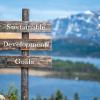
While Sustainable Development Goals (SDGs) have been introduced by The UN 2030 Agenda, unfortunately we as a planet are not currently on course. In addition, protection of the Earth's climate promoted by the Paris Agreement is also not on track. IIASA plans to join Potsdam Institute for Climate Impact Research (PIK) and several other partners to contribute to SHAPE, which will aim to study Sustainable Development Pathways (SDPs) that will achieve the SDGS in 2030 and also support sustainable development reach the goals of the Paris Agreement in 2100.
 © Photo by Torsten Muller on Unsplash
© Photo by Torsten Muller on Unsplash
The UN 2030 Agenda and its Sustainable Development Goals (SDGs) present a vision for the wellbeing of all people in prosperity, peace and partnership while preserving the integrity of our planet. The goal of protecting Earth’s climate, SDG 13, is underpinned by the Paris Agreement to hold global warming well below 2°C, through an international climate action architecture of coordinated nationally determined contributions. Numerous processes at local, national and international level are in motion to implement these global agreements, but the current initiatives are unlikely to fulfill the ambition of the Paris Agreement and the SDGs, raising the question of successful transformation processes.
SHAPE aims to contribute an in-depth analysis of sustainable development pathways (SDPs) that achieve the SDGs in 2030 and maintain sustainable development to reach the Paris climate goals until 2100. It will investigate measures to overcome trade-offs to enable simultaneous achievement of a broad range of sustainable development objectives. The SDPs will be developed using world-leading state-of-the-art integrated assessment models taking climate change as the entry point. They will be combined with regional and global scale analysis of governance challenges, where business and civil society actors now play as significant a role as national governments. Through engagement with diverse SDG action processes, stakeholders will steer the identification of regionally and sector-relevant sustainable development indicators for 2030 and beyond, and refine the usefulness of the SDPs for informing policy processes on multiple scales.
In the SHAPE project, IIASA will lead the work on climate change and inequality. We work on improving the global representation of shelter and thermal comfort and perform a global analysis energy needs required for reaching Decent Living Standards.
Partners
- Potsdam Institute for Climate Impact Research (PIK), Germany (Lead PI)
- Utrecht University, The Netherlands
- International Institute for Applied Systems Analysis (IIASA), Energy Program, Austria
- Norwegian University of Science and Technology (NTNU), Norway
- German Development Institute (DIE), Bonn, Germany
- Stockholm University (SU), Sweden
- Institute for Advanced Sustainability Studies (IASS), Germany
SHAPE runs from September 2019 to June 2023. The project is funded by the ERA-NET AXIS Call initiated by the JPI Climate, and funded by FORMAS (SE), FFG/BMBWF (AT), DLR/BMBF (DE), NWO (NL) and RCN (NO) with co-funding by the European Union. SHAPE works closely together with the other projects of the AXIS call, especially with the CHIPS project.
Publications
Mastrucci, A. , Byers, E. , Pachauri, S. , Rao, N. , & van Ruijven, B. (2022). Cooling access and energy requirements for adaptation to heat stress in megacities. Mitigation and Adaptation Strategies for Global Change 27 (8), art.no. 59. 10.1007/s11027-022-10032-7.
Wang, T., Berrill, P., Zimmerman, J.B., Rao, N. , Min, J. , & Hertwich, E.G. (2022). Improved Copper Circularity as a Result of Increased Material Efficiency in the U.S. Housing Stock. Environmental Science & Technology 56 (7), 4565-4577. 10.1021/acs.est.1c06474.
van Vuuren, D., Zimm, C. , Busch, S., Kriegler, E., Leininger, J., Messner, D., Nakicenovic, N. , Rockstrom, J., Riahi, K. , Sperling, F., Bosetti, V., Cornell, S., Gaffney, O., Lucas, P., Popp, A., Ruhe, C., von Schiller, A., Schmidt, J., & Soergel, B. (2022). Defining a Sustainable Development Target Space for 2030 and 2050. One Earth 5 (2), 142-156. 10.31223/X5B62B.
Kikstra, J. , Mastrucci, A. , Min, J. , Riahi, K. , & Rao, N.D. (2021). Decent living gaps and energy needs around the world. Environmental Research Letters 16 (9), 095006. 10.1088/1748-9326/ac1c27.
Pelz, S., Pachauri, Shonali , & Rao, N. (2021). Application of an alternative framework for measuring progress towards SDG 7.1. Environmental Research Letters 16 (8), e084048. 10.1088/1748-9326/ac16a1.
Kamei, M, Mastrucci, A. , & van Ruijven, B. (2021). A Future Outlook of Narratives for the Built Environment in Japan. Sustainability 13 (4), e1653. 10.3390/su13041653.
TWI2050 - The World in 2050 (2020). Innovations for Sustainability. Pathways to an efficient and post-pandemic future. Report prepared by The World in 2050 initiative. International Institute for Applied Systems Analysis (IIASA)
Link to all partner publications

